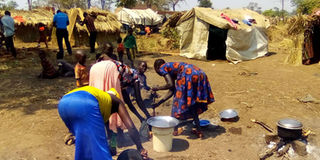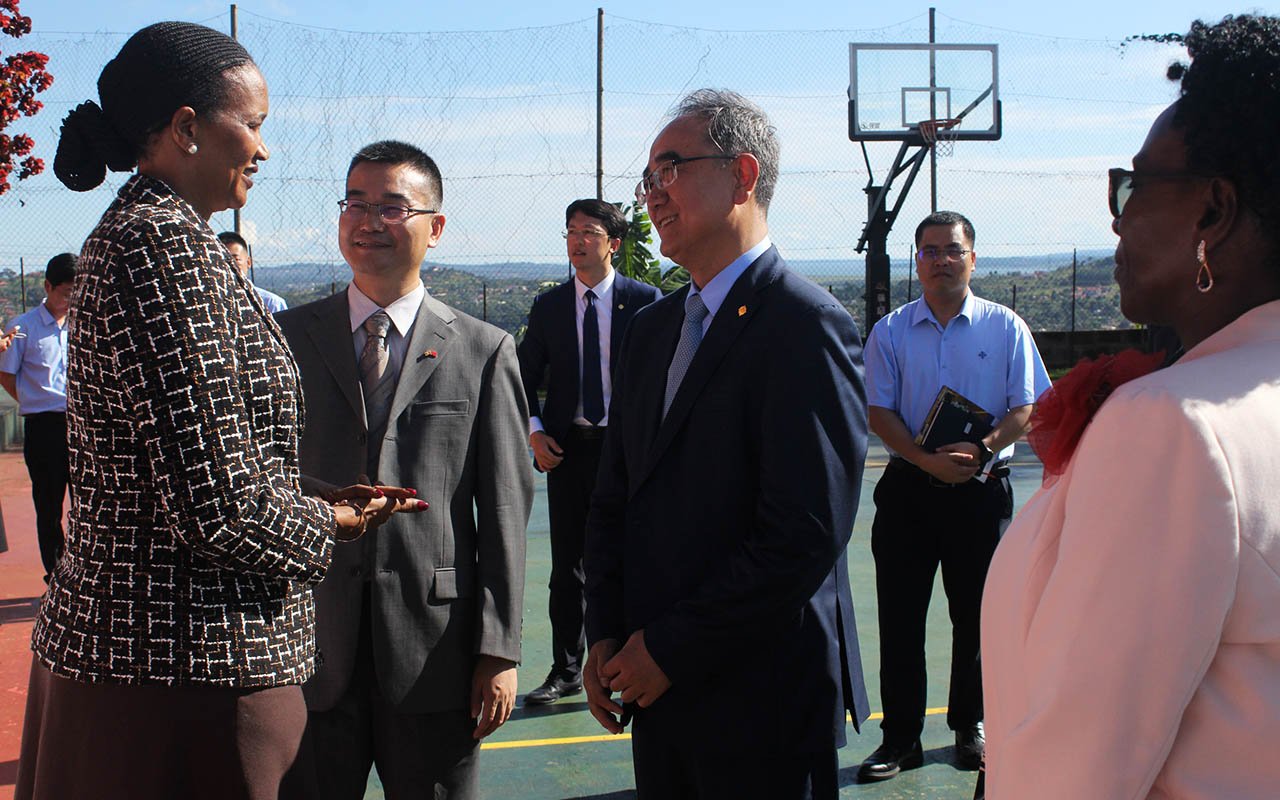Apaa land conflict: Hopes fade as Oulanyah fails to meet victims

Affected. Locals at Juka Trading Centre in Apaa Parish where they relocated following clashes between the Madi and Acholi. PHOTO BY CISSY MAKUMBI
What you need to know:
- In 2015, government begun to demarcate administrative boundaries between Amuru and Adjumani districts in what it described as a move to restore calm among communities settled on the land.
- Ms Federesi Akite Obongo, a mother of five, told Saturday Monitor that they have lost hope in all their endeavours to return to their former homes.
The hopes for 2,100 people who were forced to leave their villages and pitch camp at Juka Trading Centre in Apaa Parish following clashes between the Madi and Acholi communities in February are dwindling.
The attacks were majorly in Goro B and Juka villages in Apaa parish.
The affected residents allege that they were attacked by men, armed with spears, bows and arrows, knives and axes, believed to be from Adjumani District.
To end the clashes, on May 15, President Museveni appointed Deputy Speaker Jacob Oulanyah to chair a committee to seek lasting solution to the Apaa land wrangles between Amuru and Adjumani districts.
Mr Oulanyah, who is also the Omoro County MP, replaced Prime Minister Ruhakana Rugunda, who the President had appointed in August last year to head an eight-member committee from both Adjumani and Amuru to discuss how best the conflict could be solved but failed.
On May 12, while still heading the team, Dr Rugunda told the delegation from the two districts that the disputed Apaa land was part of East Madi Game Reserve in Adjumani and locals settled there should vacate with immediate effect.
He said those settled in the reserve and had National Identification Cards between 2013 and 2014, as residents of Apaa, would be supported with Shs10 million, 20 bags of cement and 20 iron sheets per family to enable them acquire land elsewhere.
Oulanyah team
However, the decision to relocate the population raised uproar among the leaders in Acholi sub-region upon which President Museveni immediately directed Mr Oulanyah to revisit the earlier decision.
Having taken over the leadership of the new team, Mr Oulanyah halted any activity on the contested land until a final decision is reached.
The Oulanyah-led committee members include Dr Rugunda, Lands minister Betty Amongi, Disaster Preparedness and Refugee minister Hillary Onek, First Deputy Prime Minister Moses Ali, Tourism minister Ephraim Kamuntu and State minister for Northern Uganda Grace Freedom Kwiyucwiny.
However, five months down the road, displaced locals are yet to see the committee spearheaded by Mr Oulanyah reaching out to them to hear their side of the story.
Ms Federesi Akite Obongo, a mother of five, told Saturday Monitor that they have lost hope in all their endeavours to return to their former homes.
“There has never been any engagement by the committee headed by Mr Oulanyah up to now. You can imagine the kind of life we are living. Many of our children have never accessed any form of education since displacement took place. One wonders the kind of generation we shall have in the future without education,’’ Ms Akite said.
Ms Akite added that as mothers, they find it very hard to fend for their families unlike in the past when they would realise their livelihood through farming.
She said health, education, feeding and accommodation are the most biting issues that they are facing at the displaced moment.
Apaa land activist Denis Komakech says the government is delaying the whole process so that after elections, massive eviction takes place.
“If it’s not a delaying tactic, then what is it? he asks, adding that their plea to be at least allowed to cultivate their former farmlands has also not yielded any fruit.
He says if the team leader, Mr Oulanyah, is not reaching out to them to hear their side of the story, they will trek to Parliament and demand his attention into the matter.
Leaders disappointed
The Amuru District chairperson, Mr Michael Lakony, said: “What we expected from the new committee were wonders and we thought in the shortest period of time everything would be resolved so that the displaced population returns home and resume its life afresh.”
“We are equally concerned as leaders on the ground. There is nothing to tell the displaced population as the new committee went mute and they have never even reached out to the affected persons,’’ he adds.
The Kilak North Member of Parliament, Mr Anthony Akol, says the new team is failing the Apaa people.
“Our displaced people are frustrated and in case they rise up and defend themselves of no one should blame them,” he says.
“People’s rights have been violated for long and the government seems not to bother at all,’’ he adds.
But Dr Daniel Komakech, the Acholi team leader, says the government just decided to put people waiting but nothing much should be expected of the team.
“One wonders why the land owners can be evicted in the name of game reserve, which animals are not even there,” he says.
The Adjumani District chairperson, Mr James Leku, says Mr Oulanyah has never reached out to the leadership of Adjumani on the matter, which means the earlier Cabinet ruling still stands that Apaa people should leave the area.
“I would advise government to begin processing the package it had promised the locals there so that they can leave, there is nothing much that will come their way,’’ he says
On his Facebook page, when asked about Apaa, Mr Oulanyah, said leaders must provide leadership even when times are tough. They should never jump in things just to seek popularity. “They must calculate every step they take and every decisions they take. In the end, what will work is what will count,’’ he said.
Research
In August, Amani Institute Uganda, College for Humanities and Social Science (CHUSS), Makerere University, launched a five-year research in the north termed ‘Beyond war compensation, gender justice, livelihood and land rights.
Prof Josephine Ahikire, the principal of CHUSS, said the research aims to explore the dynamics of land access from the gender perspective in the post war conflict.
Background
In 2015, government begun to demarcate administrative boundaries between Amuru and Adjumani districts in what it described as a move to restore calm among communities settled on the land. However, this resulted in violence by the two communities that later saw police and the army deploy in the area.
In June 2017, at least10 people died and more than 20 were injured after a tribal clash broke out among the Acholi and Madi communities.




